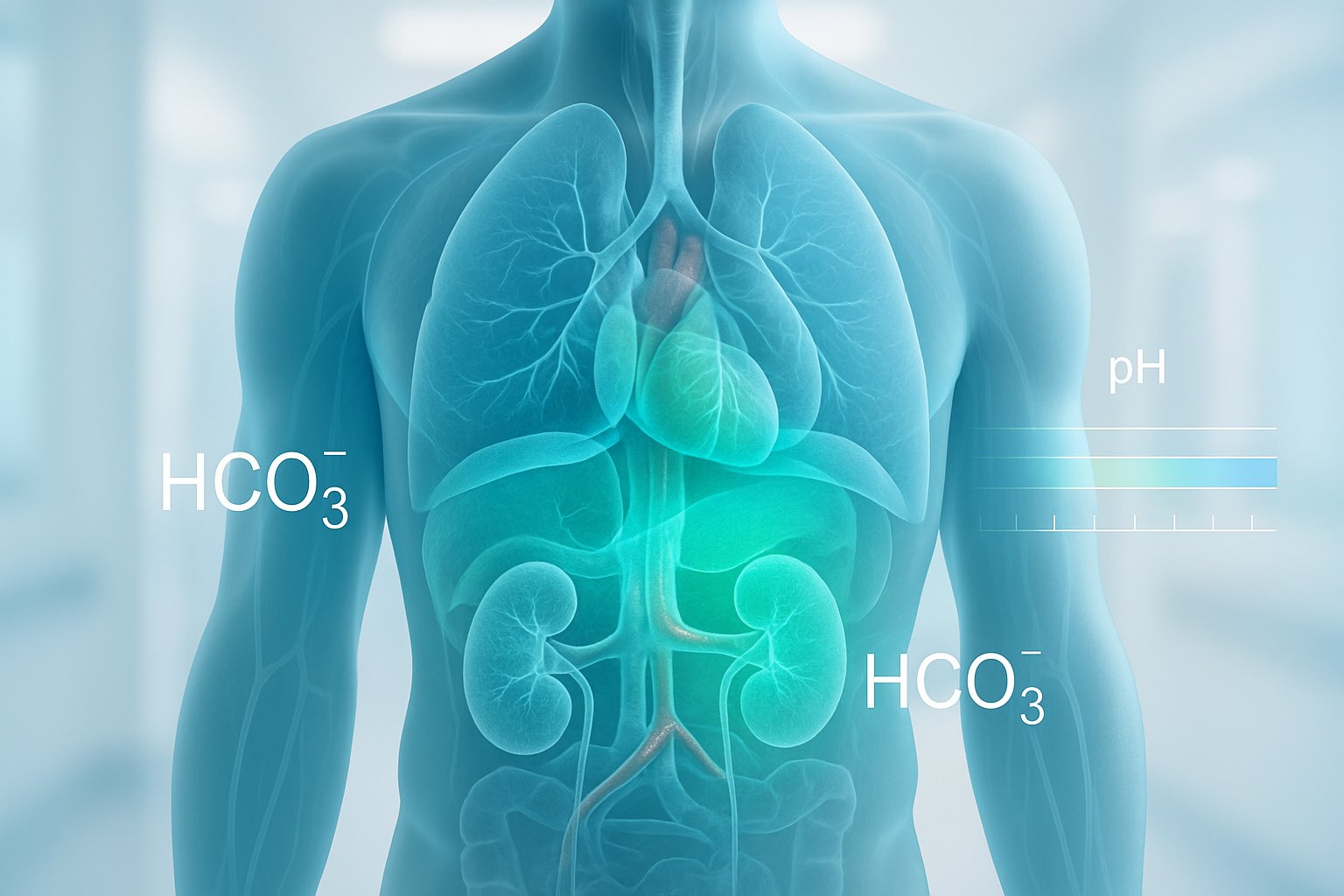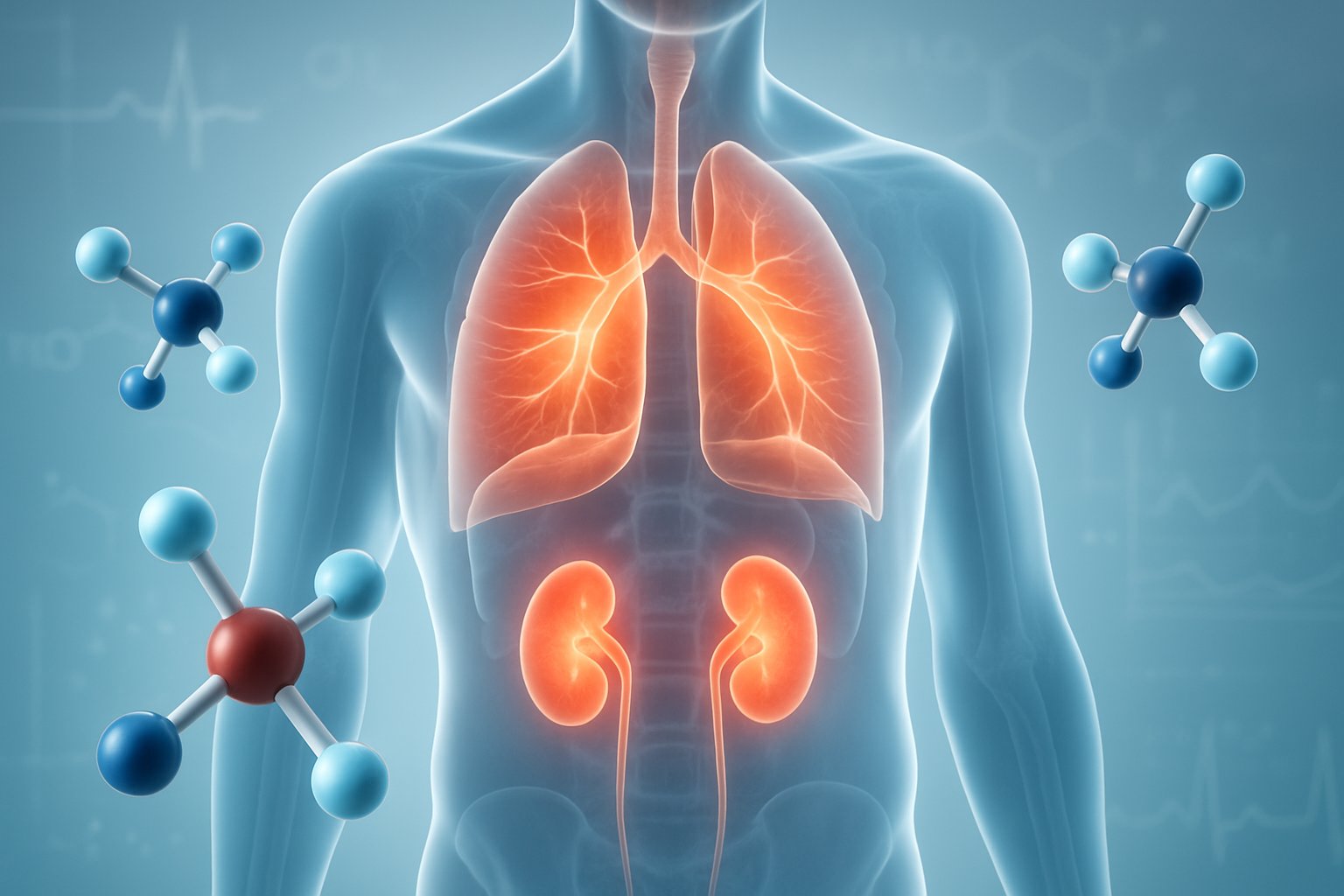High bicarbonate levels in your blood can disrupt your body’s delicate acid-base balance and lead to a condition called metabolic alkalosis. When bicarbonate levels rise too high, your blood becomes more alkaline than normal, which can cause symptoms like nausea, vomiting, muscle twitching, and confusion. This happens because bicarbonate acts as a buffer that regulates pH balance[1] in your blood.

Your body normally keeps bicarbonate levels between 22 to 26 mEq/L, but various factors can push these numbers higher. Common causes include losing stomach acid through vomiting, taking certain medications, or having kidney problems. While high bicarbonate might not seem serious at first, it can affect how your muscles, heart, and brain work.
Understanding what happens when your bicarbonate levels climb too high helps you recognize warning signs early. The good news is that doctors can usually treat this condition effectively once they identify the underlying cause.
Key Takeaways
- High bicarbonate makes your blood too alkaline and can cause muscle problems, nausea, and brain symptoms
- Normal bicarbonate levels range from 22 to 26 mEq/L, and going above this range signals metabolic alkalosis
- Treatment focuses on fixing the root cause and restoring proper acid-base balance in your body
What Is Bicarbonate and Why Is It Important?

Bicarbonate is a negatively charged ion that keeps your blood from becoming too acidic or too alkaline. It works as part of your body’s buffer system and helps maintain proper electrolyte balance.
Role of Bicarbonate in the Body
Bicarbonate forms when your body uses oxygen to make energy[2]. This process happens naturally during normal metabolism.
The bicarbonate then travels through your bloodstream to your lungs. There, it gets breathed out as carbon dioxide when you exhale.
Your kidneys also play a key role with bicarbonate. They help control how much bicarbonate stays in your blood and how much gets filtered out.
Bicarbonate is also important for kidney function, especially in filtering blood and processing waste[3]. This makes it vital for keeping your body’s waste removal system working properly.
The amount of bicarbonate in your blood changes based on your body’s needs. More bicarbonate means your blood becomes more alkaline. Less bicarbonate means your blood becomes more acidic.
Bicarbonate as an Electrolyte
Bicarbonate is one of the main electrolytes in your body. Electrolytes are minerals that carry an electric charge and help your body function.
Bicarbonate helps maintain pH levels and balance electrolyte levels throughout your body[4]. This balance is crucial for proper cell function.
Your body needs the right amount of bicarbonate to work with other electrolytes like sodium and potassium. When bicarbonate levels get too high or too low, it affects how these other electrolytes work.
Most bicarbonate in your blood travels as dissolved carbon dioxide[5]. This is why doctors measure CO2 levels to check your bicarbonate levels.
Normal bicarbonate levels help ensure your muscles, nerves, and organs can communicate properly with each other.
Bicarbonate and the Buffer System
Bicarbonate acts like a sponge that soaks up excess acid in your blood[2]. This buffering action keeps your blood pH stable.
The buffer system includes bicarbonate along with water, hydrogen, hemoglobin, phosphate, and carbon dioxide[6]. All these work together to maintain proper acid-base balance.
When your blood becomes too acidic, bicarbonate neutralizes the extra acid. This prevents dangerous changes in your blood chemistry.
The buffer system must act quickly when pH changes occur. Even small changes in blood pH can cause serious health problems.
Your lungs and kidneys work together to control bicarbonate levels. Your lungs remove carbon dioxide when you breathe, while your kidneys adjust how much bicarbonate stays in your blood.
Normal and High Bicarbonate Levels
Understanding bicarbonate levels requires knowing what normal ranges look like and how doctors measure these values. Normal bicarbonate levels range from 22-29 mEq/L[5], and elevated results can signal specific health conditions.
Normal Bicarbonate Levels in Blood
Normal bicarbonate levels are 22 to 32 mmol/L in adults or 23 to 29 milliequivalents per liter (mEq/L)[7]. These values represent the standard range that most healthy adults should maintain.
Key Normal Ranges:
- Adults: 22-29 mEq/L or 22-32 mmol/L
- Target minimum: Above 22 mEq/L
Kidney experts recommend that patients not have their serum bicarbonate levels fall below 22 mEq/L[5]. This lower threshold helps prevent metabolic acidosis.
The bicarbonate level reflects how well the kidneys and lungs work together. Healthy kidneys keep the right amount of bicarbonate (base) in the blood[5].
Bicarbonate Test and How It’s Measured
The test is done with a blood sample using a needle to draw blood from a vein in the arm or hand[7]. This simple procedure takes just a few minutes.
Doctors often measure bicarbonate as part of an electrolyte panel. It is almost always tested together with sodium, potassium, and chloride, to make sure all levels are in balance with each other[2].
Common Test Names:
- Carbon dioxide test
- CO2 test
- HCO3 test
- Basic metabolic panel
- Comprehensive metabolic panel
You don’t need to get ready for this test[7]. No fasting or special preparation is required for bicarbonate testing.
Interpreting Elevated Bicarbonate Results
A high level of bicarbonate in blood can be from metabolic alkalosis, a condition that causes a pH increase in tissue[7]. This means the body becomes too basic or alkaline.
Common Causes of High Bicarbonate:
- Severe vomiting
- Dehydration
- Chronic obstructive pulmonary disease
- Anorexia
- Certain medications
Metabolic alkalosis can happen from a loss of acid from the body, such as through vomiting and dehydration[7]. When the body loses too much acid, bicarbonate levels rise.
Test results may vary between different laboratories. Doctors consider the patient’s symptoms, medical history, and other test results when interpreting elevated bicarbonate levels.
What Happens to the Body With High Bicarbonate?

High bicarbonate levels disrupt the body’s normal pH balance and can lead to metabolic alkalosis. This condition affects blood chemistry, electrolyte balance, and various body systems.
Impact on pH and Acid-Base Balance
High bicarbonate levels push the body’s pH above its normal range of 7.35 to 7.45. The body normally maintains tight control over acid-base balance through several systems.
When bicarbonate increases, it acts like a buffer that soaks up too much acid from the blood. This creates an alkaline environment that the body struggles to correct.
The kidneys and lungs work together to maintain pH balance. High bicarbonate forces these organs to work harder to restore normal levels.
Normal pH regulation involves:
- Kidneys filtering excess bicarbonate
- Lungs adjusting breathing patterns
- Chemical buffers in the blood
The body may slow breathing to retain more carbon dioxide. This helps counteract the alkaline effects of excess bicarbonate.
Effects on Blood pH and Electrolyte Balance
Serum bicarbonate travels through the body as dissolved carbon dioxide[5], making blood pH measurements important for diagnosis. High bicarbonate levels create multiple electrolyte imbalances throughout the body.
Blood pH rises above 7.45 when bicarbonate levels get too high. This alkaline state affects how electrolytes move in and out of cells.
Common electrolyte changes include:
- Low potassium levels
- Low chloride levels
- Altered sodium balance
- Changes in calcium availability
These electrolyte imbalances can cause muscle weakness and cramping. Heart rhythm problems may also develop when electrolyte levels shift too much.
The kidneys try to restore balance by holding onto hydrogen ions. They also work to eliminate excess bicarbonate through urine.
Development of Metabolic Alkalosis
Metabolic alkalosis occurs when the body has too much bicarbonate and not enough hydrogen in the blood[4]. This condition represents the most serious consequence of high bicarbonate levels.
The condition develops when bicarbonate accumulates faster than the body can eliminate it. Common causes include prolonged vomiting, certain medications, or kidney problems.
Symptoms of metabolic alkalosis include:
- Muscle twitching and weakness
- Hand and foot spasms
- Confusion or irritability
- Nausea and vomiting
- Irregular heartbeat
The body’s compensation mechanisms may not keep up with severe bicarbonate elevation. Breathing becomes slower and shallower as the lungs try to retain carbon dioxide.
Treatment typically involves IV fluids to help restore normal pH and electrolyte balance[4]. Addressing the underlying cause prevents future episodes and complications.
Causes of High Bicarbonate Levels

High bicarbonate levels develop when the body loses too much acid or retains too much bicarbonate. The main causes include kidney problems, loss of stomach acid, certain medications, and hormone disorders.
Kidney Disease and Kidney Disorders
The kidneys control bicarbonate levels by filtering excess amounts from the blood. When kidney disease occurs, this filtering process becomes damaged.
Chronic kidney disease reduces the kidneys’ ability to remove bicarbonate properly. This causes bicarbonate to build up in the bloodstream over time.
Common kidney disorders that raise bicarbonate include:
- Chronic kidney failure
- Kidney stones blocking urine flow
- Severe dehydration affecting kidney function
- Inherited kidney defects
Damaged kidneys also struggle to balance other chemicals like sodium and chloride. Low chloride levels often occur alongside high bicarbonate in kidney disease patients.
Prolonged Vomiting and Stomach Acid Loss
Stomach acid contains high amounts of hydrochloric acid. When prolonged vomiting occurs, the body loses large amounts of this acid.
This acid loss makes the blood more alkaline and raises bicarbonate levels. The longer vomiting continues, the more severe the bicarbonate increase becomes.
Conditions causing prolonged vomiting include:
- Severe morning sickness during pregnancy
- Food poisoning or stomach infections
- Eating disorders like bulimia
- Intestinal blockages
Stomach acid loss also removes chloride from the body. This creates a pattern where bicarbonate rises while chloride drops significantly.
Medication and Diuretic Use
Several medications can increase bicarbonate levels by changing how the kidneys work or by adding alkali to the body.
Diuretics cause the kidneys to remove more water and salt from the blood. Some types also cause chloride loss, which leads to higher bicarbonate levels.
Medications that may raise bicarbonate:
- Loop diuretics (furosemide)
- Thiazide diuretics
- Antacids containing calcium or sodium bicarbonate
- Some blood pressure medications
Long-term antacid use adds bicarbonate directly to the bloodstream. People who take large amounts daily face the highest risk of bicarbonate buildup.
Endocrine and Metabolic Disorders
Hormone problems can disrupt the body’s acid-base balance and cause bicarbonate levels to rise.
Cushing’s syndrome creates excess cortisol hormone. This hormone affects how the kidneys handle bicarbonate and other chemicals.
Endocrine disorders linked to high bicarbonate:
- Cushing’s syndrome
- Primary aldosteronism (excess aldosterone)
- Severe potassium deficiency
- Inherited metabolic disorders
These metabolic disorders often cause multiple chemical imbalances at once. Patients typically show changes in sodium, potassium, and chloride along with elevated bicarbonate.
Complications and Symptoms of High Bicarbonate

High bicarbonate levels cause metabolic alkalosis symptoms[4] that affect multiple body systems. The condition triggers muscle problems, brain function changes, breathing issues, and long-term health risks.
Muscle Weakness and Cramps
High bicarbonate disrupts normal muscle function by changing the body’s electrical balance. Muscles need proper pH levels to contract and relax correctly.
Common muscle symptoms include:
- Severe muscle cramps in arms and legs
- General weakness throughout the body
- Difficulty moving or walking
- Muscle twitching or spasms
The alkaline blood affects how calcium moves in and out of muscle cells. This creates problems with muscle contraction. Patients often notice weakness in their hands and feet first.
Muscle cramps can be painful and last for several minutes. These cramps typically happen more often at night or during physical activity.
Neurological Effects: Confusion and Seizures
The brain is very sensitive to changes in blood pH levels. High bicarbonate affects how brain cells communicate with each other.
Brain-related symptoms include:
- Confusion and memory problems
- Difficulty thinking clearly
- Seizures in severe cases
- Changes in personality or mood
Confusion often starts as mild forgetfulness. Patients may have trouble remembering simple tasks or feel disoriented. Family members usually notice these changes before the patient does.
Seizures occur when bicarbonate levels become extremely high. These are medical emergencies that require immediate treatment in intensive care units.
Cardiorespiratory Concerns
High bicarbonate affects both heart rhythm and breathing patterns. The body tries to balance the alkaline blood by changing how it breathes.
Heart and lung problems include:
- Irregular heartbeat or palpitations
- Slow or shallow breathing
- Low carbon dioxide levels
- Breathing difficulties
The body naturally tries to keep carbon dioxide levels higher to balance the alkaline blood. This leads to slower, deeper breathing patterns. However, this compensation doesn’t always work well.
Patients with chronic obstructive pulmonary disease face extra risks. Their lungs already struggle to manage carbon dioxide levels properly.
Heart rhythm problems happen because high bicarbonate changes electrical signals in the heart muscle.
Chronic Complications and Risks
Long-term high bicarbonate can lead to serious health problems. The condition puts stress on multiple organ systems over time.
Long-term risks include:
- Kidney damage from trying to process excess bicarbonate
- Bone problems from mineral imbalances
- Dehydration from fluid losses
- Increased risk of infections
The kidneys work overtime trying to remove excess bicarbonate from the blood. This extra work can damage kidney tissue and reduce kidney function.
Bone health suffers because the body uses calcium and other minerals to buffer the alkaline blood. This can lead to weak bones over time.
Dehydration becomes a serious concern because many causes of high bicarbonate also cause fluid loss. The combination makes symptoms worse and harder to treat.
Diagnosis and Monitoring of High Bicarbonate
Doctors use blood tests and specialized analysis to find high bicarbonate levels in the body. They check for underlying health problems that might cause these elevated levels and track changes over time.
Laboratory Tests and Blood Panels
The most common way to detect high bicarbonate is through a basic metabolic panel or comprehensive metabolic panel. These electrolyte panels[8] check bicarbonate levels along with other important substances in the blood.
Normal bicarbonate levels range from 22-29 mEq/L[5]. Levels above 29 mEq/L indicate elevated bicarbonate.
A blood sample is taken from a vein in the arm for these tests. The bicarbonate test measures how much of this substance is in the blood plasma.
Key electrolyte measurements include:
- Sodium levels
- Potassium levels
- Chloride levels
- Carbon dioxide content
Doctors often order these tests when patients have symptoms like muscle weakness, confusion, or breathing problems. The tests help show if the body’s acid-base balance is normal.
Arterial Blood Gas Analysis
An arterial blood gas test (ABG) gives detailed information about acid-base balance. This test uses arterial blood taken from an artery, usually in the wrist.
The ABG measures three key values that help diagnose metabolic alkalosis:
| Test Value | Normal Range | High Bicarbonate |
|---|---|---|
| pH | 7.35-7.45 | Above 7.45 |
| Bicarbonate | 22-26 mEq/L | Above 26 mEq/L |
| Carbon dioxide pressure | 35-45 mmHg | Often elevated |
The ABG helps doctors tell the difference between different types of alkalosis. It shows how well the lungs are trying to fix the imbalance.
This test is more detailed than regular blood panels. It gives real-time information about how the body handles acids and bases.
Identifying Underlying Conditions
Finding the cause of high bicarbonate is important for proper treatment. Doctors look for several possible causes through additional tests and patient history.
Common causes include long-term vomiting, diuretic medications, and hormone problems. Liver disease[8] can also affect bicarbonate levels.
Additional tests may include:
- Kidney function tests
- Hormone level checks
- Urine tests
- Heart function studies
Doctors ask about medications, recent illnesses, and symptoms. They check for signs of dehydration or electrolyte imbalances during physical exams.
Some patients need repeated testing to track changes over time. This helps doctors see if treatments are working or if the condition is getting worse.
The timing of symptoms and test results helps narrow down the exact cause. Quick diagnosis leads to better treatment outcomes.
Prevention and Management Strategies
Managing high bicarbonate levels requires targeted medical treatments and lifestyle adjustments. Proper hydration, dietary changes, and careful medication management help prevent complications and restore normal pH balance.
Treatments for High Bicarbonate Levels
Doctors typically treat high bicarbonate levels with intravenous fluids containing normal saline. This treatment with IV fluids helps many people make a full recovery[4] from metabolic alkalosis.
Medical Interventions:
- IV saline solution to restore fluid balance
- Potassium chloride supplements for low potassium levels
- Magnesium replacement when deficient
- Carbonic anhydrase inhibitors in severe cases
Healthcare providers focus on reversing the factors that raise bicarbonate and prevent its excretion[9]. They address the underlying cause to prevent future episodes.
Treatment duration varies based on severity. Mild cases may resolve within days with proper fluid replacement. Severe cases require longer hospital monitoring.
Hydration and Dietary Considerations
Proper hydration plays a key role in managing bicarbonate levels. Dehydration can worsen alkalosis by concentrating bicarbonate in the blood.
Hydration Guidelines:
- Drink 8-10 glasses of water daily
- Increase fluid intake during illness or hot weather
- Avoid excessive caffeine and alcohol
Dietary Modifications:
- Include chloride-rich foods like table salt and olives
- Eat potassium-rich foods such as bananas and potatoes
- Limit foods high in sodium bicarbonate
Chloride helps balance bicarbonate levels in the body. Foods containing natural chloride support normal acid-base balance.
Potassium deficiency often accompanies high bicarbonate. Replacing potassium through diet helps restore proper electrolyte balance.
Managing Medications and Risk Factors
Certain medications can raise bicarbonate levels. People should work with their doctors to adjust these medications when necessary.
High-Risk Medications:
- Diuretics (water pills)
- Antacids containing bicarbonate
- Some blood pressure medications
- Laxatives used long-term
Risk Factor Management:
- Control vomiting with anti-nausea medications
- Manage stress through relaxation techniques
- Monitor during pregnancy for acid-base changes
- Adjust physical activity based on symptoms
Healthcare providers may switch to alternative medications that don’t affect bicarbonate levels. They monitor electrolyte levels regularly in high-risk patients.
Stress can worsen symptoms by affecting breathing patterns. Deep breathing exercises help maintain normal pH balance.
When to Seek Medical Attention
People should contact their doctor immediately if they experience severe symptoms. Early treatment prevents complications from worsening.
Emergency Warning Signs:
- Severe muscle weakness or paralysis
- Difficulty breathing or shortness of breath
- Confusion or changes in mental status
- Irregular heartbeat or chest pain
Regular Monitoring Needed For:
- Chronic kidney disease patients
- People taking multiple medications
- Those with recurring vomiting or diarrhea
- Pregnant women with severe morning sickness
Blood tests every few months help track bicarbonate levels in at-risk individuals. Healthcare providers adjust treatment plans based on these results.
People should never stop prescribed medications without medical guidance. Sudden changes can cause dangerous electrolyte imbalances.
Frequently Asked Questions

High bicarbonate levels can trigger specific symptoms and health complications that affect multiple body systems. Understanding the causes, diagnosis methods, and treatment approaches helps people recognize when medical attention becomes necessary.
What are the possible symptoms of elevated bicarbonate levels in the blood?
Elevated bicarbonate levels often cause muscle weakness and cramping throughout the body. People may experience twitching in their arms, legs, or face.
Breathing problems commonly occur with high bicarbonate. The person may breathe more slowly or take shallow breaths. This happens because the body tries to keep acid levels balanced.
Mental changes can develop as bicarbonate rises. Confusion, difficulty thinking clearly, and feeling drowsy are common signs. Some people become irritable or have trouble concentrating.
Nausea and vomiting may occur when bicarbonate levels get too high. The person might lose their appetite or feel sick to their stomach.
How might high bicarbonate levels impact kidney function?
The kidneys work harder when bicarbonate levels stay high for long periods. They must filter more chemicals and maintain proper acid balance in the blood.
High bicarbonate can make existing kidney problems worse. People with kidney disease may have trouble removing excess bicarbonate from their body.
The kidneys may produce less urine when bicarbonate levels rise. This can lead to fluid buildup and swelling in the legs, feet, or hands.
Electrolyte imbalances often develop alongside kidney stress. Sodium, potassium, and chloride levels may become abnormal when the kidneys cannot function properly.
Can an increase in bicarbonate levels cause metabolic alkalosis?
High bicarbonate levels directly cause metabolic alkalosis[7], which makes body tissues too alkaline. This condition disrupts normal chemical processes in cells.
Metabolic alkalosis affects how muscles and nerves work. The heart may beat irregularly, and muscle contractions can become weak or uncontrolled.
The body struggles to maintain proper pH when bicarbonate stays elevated. Normal pH levels range from 7.35 to 7.45, but metabolic alkalosis pushes this higher.
Brain function changes when alkalosis develops. People may experience seizures, coma, or other serious neurological problems if bicarbonate levels remain very high.
What are the potential causes of high bicarbonate in the blood?
Vomiting and dehydration commonly cause high bicarbonate levels[7] by removing acid from the body. Stomach acid loss makes the blood more alkaline.
Certain medications can raise bicarbonate levels. Diuretics, steroids, and antacids may increase bicarbonate when used regularly or in high doses.
Chronic obstructive pulmonary disease and anorexia[7] can lead to elevated bicarbonate. These conditions affect how the body processes acids and bases.
Kidney disorders sometimes cause bicarbonate retention. When kidneys cannot remove excess bicarbonate properly, levels build up in the blood.
Hormonal problems may increase bicarbonate production. Conditions affecting aldosterone or cortisol can disrupt normal acid-base balance.
How is the diagnosis of hyperbicarbonatemia typically confirmed by healthcare professionals?
Blood tests measure bicarbonate levels directly to confirm high levels. Normal bicarbonate ranges from 22 to 32 mmol/L in adults[7].
Doctors often order arterial blood gas tests alongside bicarbonate measurements. These tests show pH levels and help determine the severity of alkalosis.
Electrolyte panels check sodium, potassium, and chloride levels[7] at the same time. These minerals work together with bicarbonate to maintain proper body chemistry.
Urine tests may reveal why bicarbonate levels became high. The pH and chemical content of urine help doctors identify the underlying cause.
Additional blood work checks kidney and liver function. These organs play important roles in processing bicarbonate and maintaining acid-base balance.
What treatment options are available for managing high bicarbonate levels?
Treating the underlying cause usually brings bicarbonate levels back to normal. Doctors focus on conditions like dehydration, medication effects, or kidney problems.
Fluid replacement helps when dehydration causes high bicarbonate. IV fluids restore proper hydration and help kidneys process excess bicarbonate.
Medication adjustments may be necessary if drugs are causing elevated levels. Doctors might change doses or switch to different medications that do not affect bicarbonate.
Electrolyte replacement corrects imbalances that occur with high bicarbonate. Potassium and chloride supplements help restore normal chemical balance.
Severe cases may require hospitalization for close monitoring. Doctors can provide intensive treatment and watch for dangerous complications when bicarbonate levels become very high.
References
- What Does It Mean If Your Blood Gases Are High? 2 Types of Tests. https://www.medicinenet.com/what_does_it_mean_if_your_blood_gases_are_high/article.htm Accessed October 25, 2025
- Bicarbonate. https://www.pathologytestsexplained.org.au/ptests.php?q=Bicarbonate Accessed October 25, 2025
- Bicarbonate - (Anatomy and Physiology II). https://fiveable.me/key-terms/anatomy-physiology-ii/bicarbonate Accessed October 25, 2025
- Metabolic Alkalosis: Symptoms, Causes & Treatment. https://my.clevelandclinic.org/health/diseases/21529-metabolic-alkalosis Accessed October 25, 2025
- Serum Bicarbonate. https://www.kidney.org/kidney-failure-risk-factor-serum-bicarbonate Accessed October 25, 2025
- Just a moment.... https://www.forthwithlife.co.uk/blog/what-is-bicarbonate/ Accessed October 25, 2025
- Content - Health Encyclopedia. https://www.urmc.rochester.edu/encyclopedia/content?contenttypeid=167&contentid=bicarbonate Accessed October 25, 2025
- Metabolic Alkalosis: Diagnosis and Management in Clinical Practice. https://www.rupahealth.com/post/metabolic-alkalosis-diagnosis-and-management-in-clinical-practice Accessed October 25, 2025
- UpToDate. https://www.uptodate.com/contents/treatment-of-metabolic-alkalosis Accessed October 25, 2025
